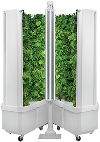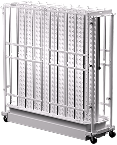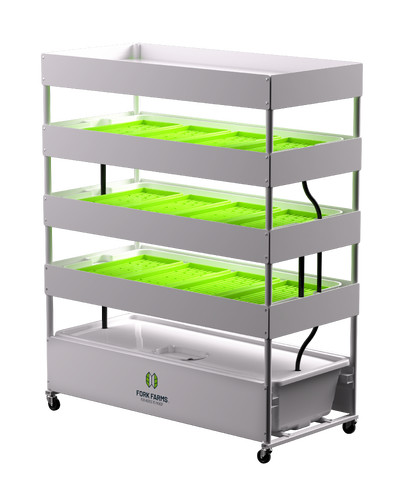Fork Farms Partner Spotlight: Concord High School Levels Up Plant Science with Flex Farm Hydroponic Systems
As September comes to an end, there's excitement in the air—particularly at Concord High School. This year, the school is embracing a groundbreaking approach to education with their Flex Farms, hydroponic growing systems that are transforming the school’s new Advanced Plant Science classes.
Hydroponics Meets the Classroom: A Perfect Match
Flex Farms provides a significant leap in how schools approach STEM (Science, Technology, Engineering, and Mathematics) education. Hydroponic systems offer students a hands-on way to learn about sustainability, nutrition, and environmental science, all while growing fresh produce right in their cafeterias or classrooms.
With more than 1,000 Flex Farms now in K-12 schools nationwide, these systems are quickly becoming a staple in modern education. Each Flex Farm comes equipped with a comprehensive K-12 curriculum aligned with the Next Generation Science Standards (NGSS). This makes it incredibly easy for teachers to integrate hydroponics into their lessons, providing everything from learning objectives and extra resources to hands-on activities that cover plant biology, nutrition, and sustainable agriculture.
Concord High School’s Growth of Advanced Plant Sciences
The Concord Community Schools/Hanover Horton Schools District has installed eight Flex Farms —one in Concord Elementary School and seven spread across the two local high schools. This marks the district’s second year of hydroponically growing fresh produce, and the excitement is palpable.
This school year, Concord High School introduced a new course to their school’s curriculum called Advanced Plant Science which is aligned with state educational science standards and uses Flex Farms for everyday learning regarding: plant growth and sustainable agriculture. The course is not just about learning theory; students get to see their work come to life. They are in charge of maintaining the school’s Flex Farms and the students are currently growing a variety of vegetables and herbs, including lettuces, tomatoes, peppers, cucumbers, cilantro, and chives. The students are planning their first harvest for mid-October when they will use their fresh foods in the school’s salad and taco bars.
Learning Beyond the Classroom
The benefits of the Flex Farms extend beyond the classroom. Concord High School’s cafeteria now serves as a living lab where students can observe their plants' growth daily. This visibility sparks greater interest in local, hydroponic food production and helps students connect more deeply with their food.
Before graduating last year, senior students created a “how-to guide” to maintain the Flex Farms, ensuring that future students can continue this exciting work. Additionally, students from Concord High School’s industrial class have started an outdoor community garden, using seedlings from the Flex Farms to provide fresh vegetables to the local community during the summer months when the systems were not in operation.
A Hands-On Approach to Learning
One of the most exciting aspects of the Flex Farms is their ability to give students a full-circle education on plant life. The hydroponic systems allow students to observe and document the entire life cycle of plants—from germination to harvest—within just 30 days. This efficient growing process keeps students engaged and connects them with real-world farming scenarios, fostering a lifelong appreciation for science and the environment.
The Flex Farms also encourage critical thinking. Students often face challenges such as pH imbalances or nutrient deficiencies and must troubleshoot these issues, deepening their understanding of STEM concepts and inspiring creativity and innovation.
Empowering Educators and Students
The Flex Farms come with a complete curriculum covering a range of topics, from the basics of plant biology to advanced sustainability issues. Lessons include:
- The Food We Eat: An overview of farming and plant growth.
- From Seed to Plant: Understanding the parts of a seed and their functions.
- The pH of Water: Learning about pH levels through interactive labs.
- Growing in the Flex Farm: Investigating plant needs and nutrient absorption.
- How to Feed 7.8 Billion People: Exploring global food gaps and food insecurity.
- Plants and the Biology of the Plant Life Cycle: Detailed plant biology and life cycles.
- Sustainability: Understanding and applying sustainability principles.
For educators interested in integrating Flex Farms into their own classrooms, we offer a sample of our school curriculum plan via our website. Contact the Fork Farms team to explore how this innovative approach can be incorporated into your school’s curriculum and cafeteria.
With Flex Farms, students aren't just learning about plant science—they’re growing their future, one plant at a time.
Important Links:
























